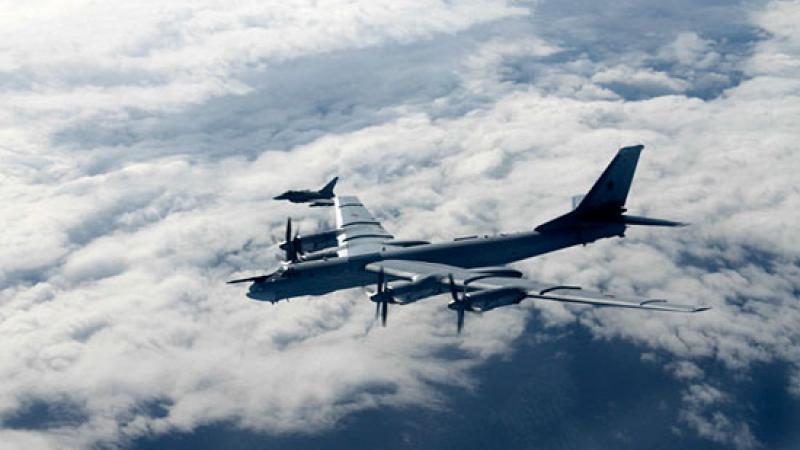As U.S. involvement in Ukraine deepens, military support drains American weapons stocks
The scale of U.S. arms being sent to Ukraine is undermining America's potential defense of Taiwan, experts warn.
The Biden administration is supplying so much military aid to Ukraine to combat Russian forces that it will take several years to replenish the drained U.S. weapons inventories, potentially undermining America's ability to defend Taiwan from a Chinese invasion, experts warn.
Concerns about the scale of American assistance are mounting amid deepening U.S. involvement in Ukraine as the nation's top U.S. military official traveled to Europe this week to monitor efforts to train Ukrainian soldiers.
"As the United States transfers massive amounts of weapons, munitions, and supplies to Ukraine, questions arise about the health of U.S. inventories," Mark Cancian of the Center for Strategic and International Studies wrote in a recent report. "Most inventories, though not all, will take many years to replace. For most items, there are workarounds, but there may be a crisis brewing over artillery ammunition."
According to Cancian's calculations based on a variety of government sources, it could take seven years, for example, to rebuild the country's inventory of 155 mm ammunition based on production levels funded in the last few years and four or five years based on a "surge" rate of increased production.
This category consists of a wide variety of non-precision projectiles that military planners appear to regard as "the most serious shortage since artillery constitutes the backbone of ground-based firepower," wrote Cancian. "Rebuilding inventories at the current production rate is probably not possible because of routine U.S. training needs."
He noted this could become a "crisis" as artillery has become "the most important combat arm" in Ukraine, which might have to ration shells and fire at only the highest priority targets — as the U.S. drains its stockpile.
As for the 155 mm precision Excalibur, an artillery shell guided by GPS, "the United States may soon run out of Excalibur projectiles to send."
Meanwhile, it will take three years to rebuild the inventory of High Mobility Artillery Rockets Systems, or HIMARS, at the recent rate of production and about 2.5 years at the surge rate.
The most well-known U.S. weapons sent to Ukraine are Javelin antitank missiles and Stinger antiaircraft missiles. According to Cancian, it will take about 12.5 years to replenish the Javelin stockpile at the recent production rate and 5.5 to 6.5 years at the surge rate. As for Stingers, he calculated 18 years at the recent rate and 6.5 years at the surge rate.
The U.S. has committed some 8,500 Javelin antitank missiles and over 1,600 Stinger antiaircraft missiles to Ukraine, according to the Defense Department.
"We've essentially used up 13 years' worth of Stinger production and five years' worth of Javelin production," Raytheon Technologies CEO Greg Hayes said at the Reagan Defense Forum last month.
In May, when the U.S. had sent only 5,000 Javelins and the 1,400 Stingers to Ukraine, lawmakers expressed concern that those figures amounted to one-third and one-quarter of the existing U.S. supply, respectively.
The Defense Department is working to restock, turning to industry to boost production. On Capitol Hill, the annual defense bill signed into law last month that sets the Pentagon's spending and policy priorities for the next fiscal year authorizes contracts to procure up to 28,300 Javelins and 5,600 Stingers.
Beyond Ukraine, the U.S. is also trying to fulfill Taiwan's orders for Stingers and Javelins, weapons that Taiwanese officials deem essential to combat a potential Chinese invasion.
"Taiwan needs to have something tangible, such as a homeland defense force," Adm. Lee Hsi-ming, Taiwan's former defense chief, said in a recent interview. "If these small-scale troops are all over Taiwan and are equipped with weapons like Stingers, Javelins and grenades, Taiwan can demonstrate its social toughness and resilience."
China considers Taiwan, a nearby island run by a democratic government, as a renegade Chinese province that must be reunited with the mainland — by force, if necessary. U.S. officials have warned repeatedly in recent months that China might invade in the next five years.
Taiwan, however, reportedly has around $19 billion in arms sales backlogged in the U.S. Many of the same weapons systems have been sent to Ukraine. Experts have noted that the U.S. must be able to surge weapons to Taiwan at a moment of crisis to deter and defend against a Chinese attack.
The U.S.-China Economic and Security Review Commission blamed the "diversion of existing stocks of weapons and munitions" to Ukraine for delays in delivering promised systems to Taiwan.
Lawmakers have been expressing concerns about aid to Ukraine undermining a potential U.S. defense of Taiwan, which maintains strong economic ties and defense cooperation with Washington.
Sen. Josh Hawley (R-Mo.), for example, argued in a recent letter to Secretary of State Antony Blinken that the Biden administration's extensive military aid to Ukraine has compromised more important efforts to strengthen Taiwan's defenses.
Concerns about the status of U.S. weapons inventories come as Washington appears to be deepening its involvement in Ukraine.
Gen. Mark Milley, chairman of the Joint Chiefs of Staff, on Tuesday had his first in-person meeting with Gen. Valery Zaluzhny, the top officer in Ukraine's armed forces, since Russia invaded Ukraine early last year.
The face-to-face came two days after the U.S. military began expanded combat training of Ukrainian forces in Germany. Milley visited the training facility on Monday, explaining the program is meant to hone the skills of Ukrainian forces so they'll be better prepared to defend themselves by launching an offensive or countering Russian attacks.
"This is not a run-of-the-mill rotation," said Milley. "This is one of those moments in time where if you want to make a difference, this is it."
Just the News reached out to the Pentagon, which didn't respond to inquiries asking if the U.S. is increasing the scope of its support for Ukraine and whether the military is concerned about depleting key weapons arsenals, especially when it comes to the ability to defend Taiwan from a potential Chinese invasion.
Milley's trip came a few days after Ukrainian Defense Minister Oleksii Reznikov told the BBC that Ukraine is a "member of NATO, de facto not de jure."
Under Article Five of the North Atlantic Treaty, NATO's founding document, any attack on a NATO member "shall be considered an attack against them all." However, Ukraine is not a member of NATO and therefore not protected by the treaty's collective defense obligations.














